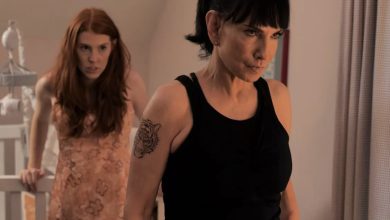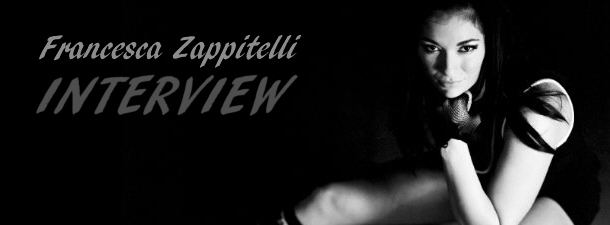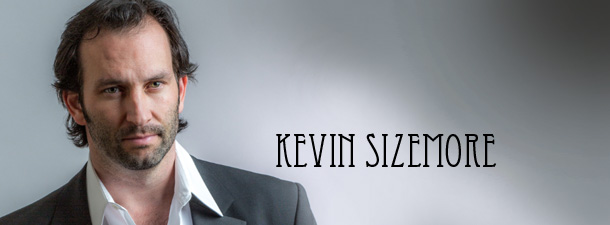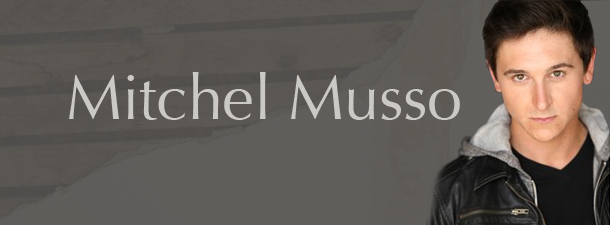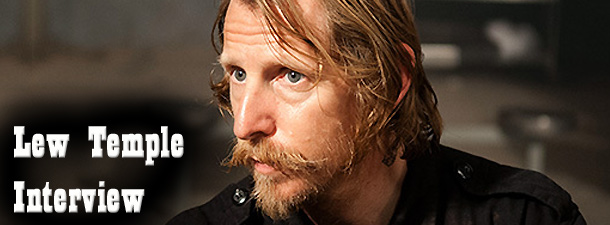Troll Inc.: Interview with filmmaker George Russell

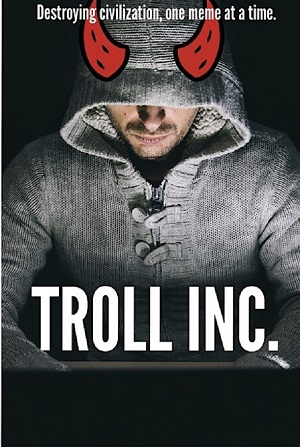 Filmmaker George Russell is into documentary films. Relatively inexpensive to make and easy to handle if you’ve got a knack for research, documentary films can also help teach people about a specific topic. George’s latest movie “Troll Inc.” chronicles the story of the famous internet troll Andrew Auernheimer who, via his online pseudonym ‘weev’, wreaked havoc from a computer.
Filmmaker George Russell is into documentary films. Relatively inexpensive to make and easy to handle if you’ve got a knack for research, documentary films can also help teach people about a specific topic. George’s latest movie “Troll Inc.” chronicles the story of the famous internet troll Andrew Auernheimer who, via his online pseudonym ‘weev’, wreaked havoc from a computer.
“Troll Inc.” set out to explore why ‘weev’ and likeminded hackers do the things that they do. The film also helps viewers gain a perspective of just how much damage these unscrupulous activities have done to the culprit’s own lives.
George Russell recently granted an exclusive interview where he discussed this movie, his experience being a documentary film maker, and the things he learned about the hidden world of trolls and hackers.
Meagan Meehan (M.M.) of Movie Vine: What inspired you to become a filmmaker?
George Russell (GR): I really think it’s like being a drug addict or an alcoholic. There is a compulsion to it that takes over and causes you to act irrationally. At times it makes no sense why you’re doing what you’re doing; you’re making no money and your film could quite possibly be an utter failure. But, there is something about making a film, or writing something, that has an otherworldly quality to it. When you watch it you’re like “How did I do that?” It doesn’t seem connected to you. There is that aspect to it of being in an opium den, watching your dreams play themselves out in the ether.
MM: And was it always documentaries that you were primarily interested in?
GR: No but they’re the easiest and cheapest thing to make well. Starting out in fiction films is tough if you don’t have a lot of money or you’re not a super go-getter salesman. I hate asking people to do hard work for free and you find yourself doing that a lot on a no-budget or low-budget feature. Lugging around c-stands all day for no money and getting up at 5am isn’t fun. It’s also weird being the director in that scenario because you’re literally the only person that will benefit. No one gives a shit who the gaffer or the sound guy was. It’s just not for me, at least not right now. On docs you don’t have to rely on anyone else or ask permission, you just do it, and sometimes that’s the only way to get it done. I think when Francis Ford Coppola or whoever it was who said the most beautiful film in history was going to be made by some kid with a cheap video camera, it will probably end up actually being a documentary.
MM: I imagine research is a large part of the job with docs?
GR: Yes, I had court transcripts, arrest warrants, and all that to pour over but for this film it was also thousands of pages of FBI and DOJ documents that we received from an FOIA lawsuit and every page had to be gone over. It was a lot of work and the associate producer Jennifer Schwager helped with that quite a bit. Some of it was fascinating and ultimately it added a lot to the trustworthiness of the film – as in there were documents backing up the claims of the people we interviewed, but it was hell going through that process and it took forever. It easily added a year to the film. The amount of paperwork generated by three government agencies over one computer programmer/internet troll was awe inspiring. It made a Kafka novel seem like a feel-good read in comparison. There were thousands of pages of documents related to surveillance, arrest, prosecution and imprisonment representing a similar number of man hours. It made you wonder when efficiency will come to bureaucratic structures because Andrew was just one guy doing acts that had to be interpreted as criminal. Imagine the tens of thousands of other people they’re amassing this much material on that are actual criminals. It boggles the mind.
MM: In terms of “Troll Inc.” what was involved before you even rolled an inch of film?
GR: I was supposed to fly to Afghanistan and be embedded with an Army unit that my friend was the Captain of, but that fell through so I was looking around for anything to make a film on. I’d been to Occupy Wall Street and was getting interested in online communities organizing for activism, things like Anonymous. But Occupy Wall Street and Anonymous weren’t really doing anything new, they were just doing it in new ways. They hadn’t discovered how these Leftist progressive organizations are really co-opted by corporate America. Occupy Wall Street was ultimately very good for Amazon, Google and Starbucks, for example because they set the stage for those corporate entities to adopt their language and posture. Around that time, I was reviewing books for PopMatters and they assigned me Parmy Olson’s book We Are Anonymous, which featured weev/Andrew Aurnheimer. I looked him up and he was in the midst of a federal court case for computer hacking which was based on what was actually one of the biggest media hoaxes of all time. It had almost nothing to do with hacking. From there it was asking him to do that film, which he readily agreed to and then buying tickets for the Director of Photography, Krystof Andres, and I to fly to New York City to start interviews with Andrew and his friends. I based the entire film off the stories and opinions told in the interviews we did over the course of two and half years, which is the worst possible way to make a documentary. It is insanely time consuming and completely inefficient. We interviewed over 30 people for the film and at one point the rough cut was 6 hours long. I wouldn’t recommend the process I undertook to anyone but it eventually worked out. I imagined I could tell the story of computer programming culture, hacking, internet trolling, US law as it relates to hackers, and free speech issues all in 80 minutes. It didn’t work out that way, unfortunately.
MM: What was it about ‘Weev’ that interested you?
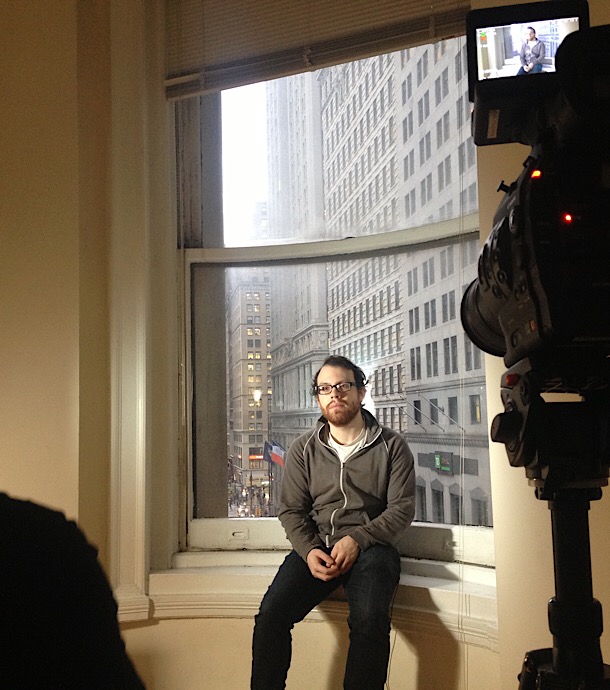 GR: At that time, he was an iconoclast and absolutely hilarious. Plus, he said what was on his mind and stood for what he believed in. Most people look to their social milieu or the media to tell them what is permissible and how they should act. He seemed to be operating entirely on his own sense of right and wrong. He was also incredibly intelligent and a throwback in terms of a conversationalist. He could talk about almost any subject fluently. But, he came from this underground troll culture that had a different set of values and norms; some of it very disturbing and seemingly immoral, but when you dug into it, it would be consistent with their own morality, which was computer programmer morality, not normal morality. As the avatar for what was about to explode into the mainstream he was certainly an interesting character and the perfect subject for a film. And, it was endlessly amusing that a bunch of twenty-something derelicts (some of them drug-addled and almost homeless, others working at Best Buy, and some making $100k+ salaries) were able to manipulate the entire world’s supposedly professional media structure on more than one occasion. It was the first thing that opened my eyes to how the news media has nothing whatsoever to do with the truth or with what is actually good for society. They all traffic in outrage. Some put a veneer of respectability on it, but at the end of the day it’s all outrage. It’s all gossip. It’s all clickbait.
GR: At that time, he was an iconoclast and absolutely hilarious. Plus, he said what was on his mind and stood for what he believed in. Most people look to their social milieu or the media to tell them what is permissible and how they should act. He seemed to be operating entirely on his own sense of right and wrong. He was also incredibly intelligent and a throwback in terms of a conversationalist. He could talk about almost any subject fluently. But, he came from this underground troll culture that had a different set of values and norms; some of it very disturbing and seemingly immoral, but when you dug into it, it would be consistent with their own morality, which was computer programmer morality, not normal morality. As the avatar for what was about to explode into the mainstream he was certainly an interesting character and the perfect subject for a film. And, it was endlessly amusing that a bunch of twenty-something derelicts (some of them drug-addled and almost homeless, others working at Best Buy, and some making $100k+ salaries) were able to manipulate the entire world’s supposedly professional media structure on more than one occasion. It was the first thing that opened my eyes to how the news media has nothing whatsoever to do with the truth or with what is actually good for society. They all traffic in outrage. Some put a veneer of respectability on it, but at the end of the day it’s all outrage. It’s all gossip. It’s all clickbait.
MM: How did you first make contact with him?
GR: This was the easy part. I started a conversation on Twitter and it went from there.
MM: Was he easy to make the movie with?
GR: Andrew doesn’t have much to hide and there was very little we couldn’t talk about, even what I would consider tough subjects like people he’d been accused of harassing and his parents who he’s estranged from, at least to my understanding. Keep in mind this was prior to his being released from prison and all that he’s done since then so it was a very different situation that it would be today.
MM: What do you believe the message of the movie is?
GR: There are several messages in the film and there’s a nice encapsulation over time lapse imagery at the end to clue anyone in who wasn’t picking up on them during the main part of the film. However, the foremost point of the film is that Andrew isn’t unique. He may be the most extreme, distilled version of what our hyper-commercialized consumer culture has become but we all share his attributes in our own souls, no matter what side of the political spectrum we’re on.
MM: Thus far, what has been the best part of working in the filmmaking industry?
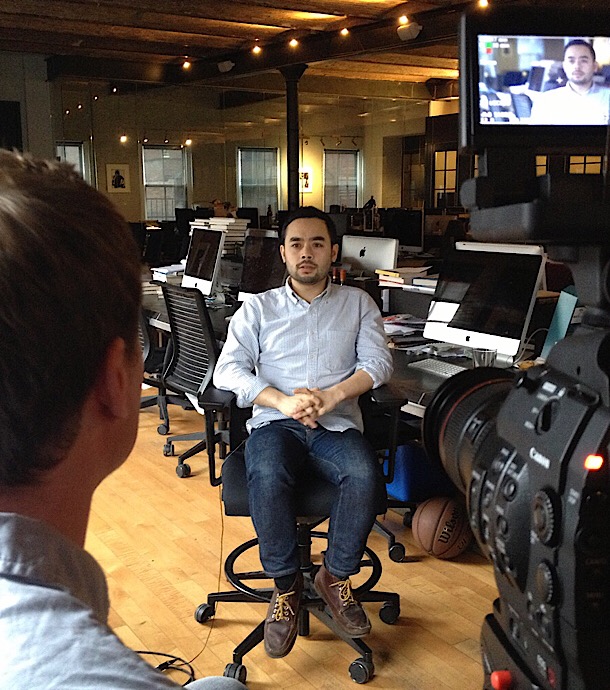 GR: Seeing something you made be appreciated by those who see it. It’s definitely ego gratifying but it’s also more than that. I was granted access to a world no one will have access to again, and in many ways no longer exists. When the film was featured at festivals the amount of baby-boomers that came up to me telling me how frightened the film made them was an interesting contrast to all the people under thirty who came up and said, “I’m so glad you actually understood my world.” Seeing someone react to and engage with your work is the best part, whether they like it or not, and there will be many people who hate this film.
GR: Seeing something you made be appreciated by those who see it. It’s definitely ego gratifying but it’s also more than that. I was granted access to a world no one will have access to again, and in many ways no longer exists. When the film was featured at festivals the amount of baby-boomers that came up to me telling me how frightened the film made them was an interesting contrast to all the people under thirty who came up and said, “I’m so glad you actually understood my world.” Seeing someone react to and engage with your work is the best part, whether they like it or not, and there will be many people who hate this film.
MM: Career wise, where do you see yourself in ten years?
GR: I’d like to make a living off of just making documentaries. And, there are people besides Alex Gibney and Errol Morris who actually do it. I freelance in TV production in Los Angeles and it would be nice to have just two or three significant projects through the year I can concentrate on instead of bouncing from set to set.
MM: Do you have any upcoming projects that you would like to mention?
GR: I’m working on my next film which is on Russia, Vladimir Putin, and how Russia is slowly but surely cornering the world’s energy markets, especially when it comes to supplying Europe and China with oil and natural gas. It’s one of the most underreported stories in history and has very real implications for the US economy since they are aiming to eventually dethrone the US Dollar as the de-facto way of paying for oil on the global market. Once the US Dollar is no longer the world reserve currency we will find it very hard to pay our massive debt. And it’s not a conspiracy theory. It’s actually verifiably happening, but for a variety of reasons the US media won’t report on it. My advice is to not start questioning the stories you hear on the news. Once you do you realize Noam Chomsky, despite his politics, was right: everything we do, say, believe and think is controlled by the media, which is really an arm of the permanent bureaucratic structure of the US Government.
MM: What advice would you give to someone who is aspiring to enter the industry, especially as a filmmaker?
GR: First, find at least a few people you can work with and move forward together with. For met that’s the guy who shot the film, Krystof Andres. He’s willing to help me out and I help him out and together we make a good team. It’s also the sound designer on the film, Dean Beville, the guy who did sound design for Pulp Fiction, among others films. We met at a party one night and started talking about the film and he insisted on being a part of it and we’ve become friends because of it. I don’t think you have to be best buddies with everyone who works on your films but when you’re starting out you need good people around you to make you look good. If I’d shot this whole film myself it would’ve looked like garbage and Krystof made it look like a real film. Dean did the same thing with the sound. These two guys made the film what it is as much as I did.
Second, you have to want to do it in a way that you couldn’t ignore if you tried. There are no rules and no one to tell you that you can or can’t do it, so you have to have the balls to just step out there and get it done. It has to be a calling. But, the flipside of that is hard work and dedication will win the day and is a must if you want to succeed. There are lots of bad filmmakers who just have more work ethic than others who may have more innate talent but can’t stop watching Internet Porn and flipping through Instagram. Like computer programming it is meritocratic from that standpoint. If you’re willing to chain yourself to the edit room and not give up until you have something watchable, no matter how long it takes or how many cuts of the film you do, you’ll be fine. And yes, the wealthy kids will always do better if they have that same drive but life isn’t always fair so figure out how to turn the tables to your advantage. Usually your only advantage will be to get up earlier than the other guy and stay later.
* * * * *
To learn more, visit Wikipedia, IMDb, and Facebook.
